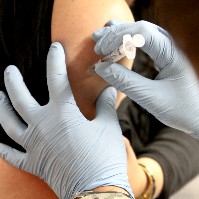TechnoVax Inc., a biotechnology company in Tarrytown, New York, received a grant from National Institute of Allergy and Infectious Diseases, part of National Institutes of Health, to develop a vaccine that protects against a wide assortment of flu strains. The initial award of $300,000, made under the Small Business Innovation Research (SBIR) program at NIH, covers the first year of a two-year project.
The TechnoVax technology is based on research on influenza virus-like particles by company founder and president Jose Galarza. Virus-like particles resemble native viruses, but do not contain nucleic acid, the genetic material in viruses. The lack of nucleic acid leaves the particles unable to replicate and thus are not infectious and safer to handle, but still generate an immune response .
In this project, TechnoVax proposes reengineering hemagglutinin molecules that coat the surface of influenza viruses and bind to the cells being infected. Antibodies targeting these hemagglutinin molecules, says TechnoVax, were found to neutralize a broad spectrum of influenza viruses. Therefore, adding reengineered hemagglutinin molecules to virus-like particles should lead to a broadly neutralizing vaccine.
The research is designed to prove the concept, i.e. show the scientific merit and commercial feasibility of the process, with preclinical lab tests and animal models.The company plans to test the technique on three diverse viruses. If the results support the proposed process, TechnoVax aims to request further SBIR funding to develop a workable vaccine.
TechnoVax says its manufacturing methods do not use the current approach of most vaccine producers of infecting eggs with live viruses to produce vaccines, but rather make use of cell cultures that can produce a wide variety of vaccines. The cell method, says the company, produces vaccines that generate a strong immune response, yet because the virus-like particles are non-infectious, their methods are safer and work faster than the infected egg method.
Read more:
- FDA Clears Sanofi Four-Strain Flu Vaccine for Adults, Kids
- Clinical Trials To Test More Tamiflu Effects, Plasma on Flu
- FDA Approves Flu Vaccine Based on Engineered Viruses
- FDA Extends Flu Therapy Approval for Infants
- FDA Approves Cell Culture Seasonal Flu Vaccine


 RSS - Posts
RSS - Posts
[…] Biotech Gets Small Business Funds for Universal Flu Vaccine […]